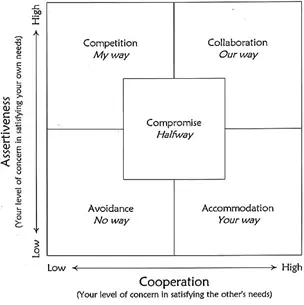
What is Conflict?
When we say “Conflict”, the first word comes to our mind is Fight, Avoid, Anger, Lose, Pain, Control, War, Hate, Impasse, Loss, Destruction, Bad, Fear, Wrong doing, Mistake etc., As you can see, conflicts is almost universally perceived as a negative occurrence
A conflict is a situation when the interests, needs, goals or values of involved parties interfere with one another. A conflict is a common phenomenon in the workplace. Different stakeholders may have different priorities; conflicts may involve team members, departments, projects, organization and client, boss and subordinate, organization needs vs. personal needs. Often, a conflict is a result of perception. Is conflict a bad thing? Not necessarily. Often, a conflict presents opportunities for improvement. Therefore, it is important to understand (and apply) various conflict resolution techniques.
Conflict Management Techniques
Conflict Management Techniques is the practice of recognizing and dealing with disputes in a rational, balanced and effective way. Following are the techniques one needs to apply based on the circumstances. Techniques should be evaluated and applied based on the own needs vs others needs:
• Collaborating – I win, you win
• Compromising – Win some, lose some (You bend, I bend)
• Accommodating – I lose, you win
• Competing – I win, you lose
• Avoiding – No winners, No losers

Collaborating (I win, you win)
Collaboration involves an attempt to work with the other person to find a win-win solution to the problem in hand – the one that most satisfies the concerns of both parties.
When to Apply:
• When there is a high level of trust
• When you don’t want to have full responsibility and you want others to also have “ownership” of solutions
• When the people involved are willing to change their thinking as more information is found and new options are suggested
• When a long-term relationship is important
Compromising (Win some, lose some)
Compromising looks for an expedient and mutually acceptable solution which partially satisfies both parties.
When to use:
• When people of equal status are equally committed to goals
• When time can be saved by reaching intermediate settlements on individual parts of complex issues
• When the goals are moderately important and not worth the use of more assertive or more involving approaches, such as competing or collaborating
• To reach temporary settlement on complex issues
• To reach convenient solutions on important issues
• As a first step when the involved parties do not know each other well or haven’t yet developed a high level of mutual trust
Accommodating/Smoothing (I lose, you win)
Accommodating the concerns of other people first of all, rather than one’s own concerns
When to use:
• When an issue is not as important to you as it is to the other person
• When it is important to provide a temporary relief from the conflict or buy time until you are in a better position to respond/push back
• When you realize you are wrong
• When you are willing to let others learn by mistake
• When harmony is extremely important
Competing (I win, you lose)
Also known as forcing. An individual firmly pursues his or her own concerns despite the resistance of the other person. When goals are extremely important, one must sometimes use power to win
When to use:
• In certain situations when all other, less forceful methods, don’t work or are ineffective
• When you know you are right
• When time is short and a quick decision is needed
• As a last resort to resolve a long-lasting conflict
• When you need to stand up for your own rights, resist aggression and pressure
Avoiding / Withdrawing (No winners, no losers)
Avoids conflict by withdrawing, sidestepping, or postponing
When to use:
• When the conflict is small and not worth the effort
• When more important issues are pressing and you feel you don’t have time to deal with this particular one
• When more information is needed
• When it is not the right time or place to confront the issue
• When you need time to think and collect information before you act (e.g. if you are unprepared or taken by surprise)


